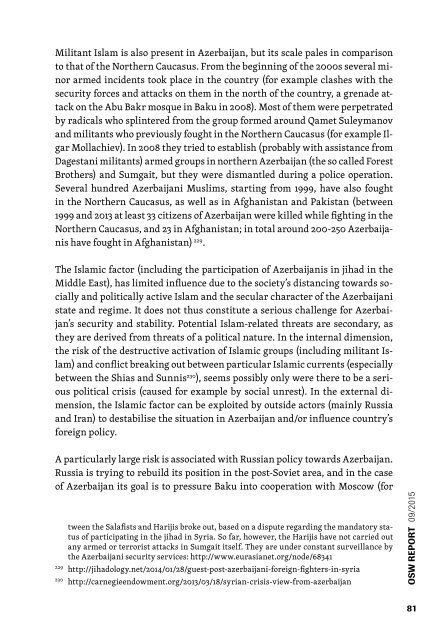HOMO JIHADICUS
homojihadicus
homojihadicus
Create successful ePaper yourself
Turn your PDF publications into a flip-book with our unique Google optimized e-Paper software.
Militant Islam is also present in Azerbaijan, but its scale pales in comparison<br />
to that of the Northern Caucasus. From the beginning of the 2000s several minor<br />
armed incidents took place in the country (for example clashes with the<br />
security forces and attacks on them in the north of the country, a grenade attack<br />
on the Abu Bakr mosque in Baku in 2008). Most of them were perpetrated<br />
by radicals who splintered from the group formed around Qamet Suleymanov<br />
and militants who previously fought in the Northern Caucasus (for example Ilgar<br />
Mollachiev). In 2008 they tried to establish (probably with assistance from<br />
Dagestani militants) armed groups in northern Azerbaijan (the so called Forest<br />
Brothers) and Sumgait, but they were dismantled during a police operation.<br />
Several hundred Azerbaijani Muslims, starting from 1999, have also fought<br />
in the Northern Caucasus, as well as in Afghanistan and Pakistan (between<br />
1999 and 2013 at least 33 citizens of Azerbaijan were killed while fighting in the<br />
Northern Caucasus, and 23 in Afghanistan; in total around 200-250 Azerbaijanis<br />
have fought in Afghanistan) 229 .<br />
The Islamic factor (including the participation of Azerbaijanis in jihad in the<br />
Middle East), has limited influence due to the society’s distancing towards socially<br />
and politically active Islam and the secular character of the Azerbaijani<br />
state and regime. It does not thus constitute a serious challenge for Azerbaijan’s<br />
security and stability. Potential Islam-related threats are secondary, as<br />
they are derived from threats of a political nature. In the internal dimension,<br />
the risk of the destructive activation of Islamic groups (including militant Islam)<br />
and conflict breaking out between particular Islamic currents (especially<br />
between the Shias and Sunnis 230 ), seems possibly only were there to be a serious<br />
political crisis (caused for example by social unrest). In the external dimension,<br />
the Islamic factor can be exploited by outside actors (mainly Russia<br />
and Iran) to destabilise the situation in Azerbaijan and/or influence country’s<br />
foreign policy.<br />
A particularly large risk is associated with Russian policy towards Azerbaijan.<br />
Russia is trying to rebuild its position in the post-Soviet area, and in the case<br />
of Azerbaijan its goal is to pressure Baku into cooperation with Moscow (for<br />
tween the Salafists and Harijis broke out, based on a dispute regarding the mandatory status<br />
of participating in the jihad in Syria. So far, however, the Harijis have not carried out<br />
any armed or terrorist attacks in Sumgait itself. They are under constant surveillance by<br />
the Azerbaijani security services: http://www.eurasianet.org/node/68341<br />
229<br />
http://jihadology.net/2014/01/28/guest-post-azerbaijani-foreign-fighters-in-syria<br />
230<br />
http://carnegieendowment.org/2013/03/18/syrian-crisis-view-from-azerbaijan<br />
PRACE OSW REPORT OSW 09/2012 09/2015<br />
81


